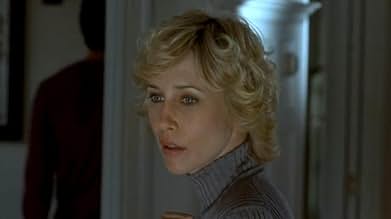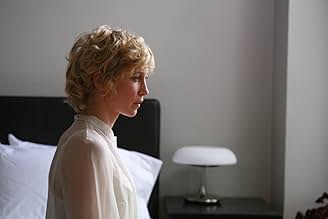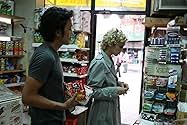IMDb-BEWERTUNG
6,4/10
1735
IHRE BEWERTUNG
Füge eine Handlung in deiner Sprache hinzuWhen an American woman begins a dangerous relationship with an attractive immigrant worker, in order to save her marriage, she finds her true self.When an American woman begins a dangerous relationship with an attractive immigrant worker, in order to save her marriage, she finds her true self.When an American woman begins a dangerous relationship with an attractive immigrant worker, in order to save her marriage, she finds her true self.
- Auszeichnungen
- 1 Gewinn & 3 Nominierungen insgesamt
David Lee McInnis
- Andrew
- (as David McInnis)
- …
Empfohlene Bewertungen
I really, really admire Vera Farmiga for taking on this project. How can you not? Allow me to explain.
If you can suspend logical disbelief while watching this film, you will be swept away. The movie had a quiet and patient, but very powerful undercurrent.
It deals so nonchalantly with something that is so uncommon in movies nowadays, that I have to make mention of it. An Asian male in honest and open sex scenes with a white female. The real achievement here is that this movie avoids the race issue altogether. The director does not turn it into some kind of elephant in the room. No, it is an elephant of our own Western making, is it not? Was anyone else shocked to see love portrayed this way, where it is truly is shown as universal, not just possible between chosen ethnic pairings? The movie did not treat it like a big deal at all. The white girl - Asian guy couples I've met in real life don't treat it like a big deal either. I believe this ethnic pairing - currently, perhaps the only interracial pairing that actually occurs less frequently in Western movies than it does in real life - will become more commonplace as the Asian cinema industry matures, as the West becomes ever-increasingly comfortable with the East, as both sides evolve towards the human average, and there are more Asian actors from which to choose.
Now that aside, let's get back to the film itself, because it is more than capable of standing proudly on its own feet without its groundbreaking nonchalant attitude towards race.
Tremendous acting, especially from Ms. Farmiga and Jung-woo Ha, the "homewrecker." The amount of emotion that these two are able to convey in nonverbal moments is truly stunning. You will be moved.
The set designs and cinematography, in addition to the beautiful actors themselves, are a visual feast - a real aesthetic treat.
The sex scenes were very tasteful and well-done. As the relationship develops, so clearly does the depth and honesty of their physical relations, to the point where Farmiga's character is able to climax by simply daydreaming about her lover.
You may know the entire plot line to this movie already, and you will still have an A+ experience watching how it was executed.
I loved this film. It defied almost all my expectations, and will probably watch it several times over the course of my life. I would recommend that anyone who decides to watch this film, too, find within themselves a fraction of Vera Farmiga's open-mindedness, boldness, and vision when she took on this project.
A standing ovation for her.
If you can suspend logical disbelief while watching this film, you will be swept away. The movie had a quiet and patient, but very powerful undercurrent.
It deals so nonchalantly with something that is so uncommon in movies nowadays, that I have to make mention of it. An Asian male in honest and open sex scenes with a white female. The real achievement here is that this movie avoids the race issue altogether. The director does not turn it into some kind of elephant in the room. No, it is an elephant of our own Western making, is it not? Was anyone else shocked to see love portrayed this way, where it is truly is shown as universal, not just possible between chosen ethnic pairings? The movie did not treat it like a big deal at all. The white girl - Asian guy couples I've met in real life don't treat it like a big deal either. I believe this ethnic pairing - currently, perhaps the only interracial pairing that actually occurs less frequently in Western movies than it does in real life - will become more commonplace as the Asian cinema industry matures, as the West becomes ever-increasingly comfortable with the East, as both sides evolve towards the human average, and there are more Asian actors from which to choose.
Now that aside, let's get back to the film itself, because it is more than capable of standing proudly on its own feet without its groundbreaking nonchalant attitude towards race.
Tremendous acting, especially from Ms. Farmiga and Jung-woo Ha, the "homewrecker." The amount of emotion that these two are able to convey in nonverbal moments is truly stunning. You will be moved.
The set designs and cinematography, in addition to the beautiful actors themselves, are a visual feast - a real aesthetic treat.
The sex scenes were very tasteful and well-done. As the relationship develops, so clearly does the depth and honesty of their physical relations, to the point where Farmiga's character is able to climax by simply daydreaming about her lover.
You may know the entire plot line to this movie already, and you will still have an A+ experience watching how it was executed.
I loved this film. It defied almost all my expectations, and will probably watch it several times over the course of my life. I would recommend that anyone who decides to watch this film, too, find within themselves a fraction of Vera Farmiga's open-mindedness, boldness, and vision when she took on this project.
A standing ovation for her.
While the romance genre is something I'm new to, I'd have to say this was one of the best ones I've seen (please remember, I've only watched about 5 romance movies in my 32 years of life).
A love that develops between people of two different races and cultures is something that I find very fascinating. It proves that we all want the same thing, no matter what creed, culture, race, nation, religion, whatever we come from.
That being said, Vera Farmiga puts on her best "desperate woman" role (I believe she won the Emmy for Bates Motel for playing a character I'd describe as such). Desperate to please her Korean-American husband and his family, she goes to a sperm clinic alone and witnesses a Korean man with an expired visa getting rejected as a donor.
Intrigued by the possibility of covertly and unmaliciously fooling her husband by having sex with a Korean man simply for the sake of having a baby she can at least pretend belongs to her and her husband, she follows the rejected sperm donor and eventually gives him a business proposal.
What follows is story of inner conflict, the desire (and simultaneous torment) to live up to societal and cultural expectations (and how they can get in the way of true love), as well as how other things out of our control can get in the way of being with the one we want.
While the epilogue left me a little confused, I was for the most part enraptured by the film. I think it'd be appealing to anyone having trouble finding true happiness and love.
Also, did Vera break the 4th wall at the end?
A love that develops between people of two different races and cultures is something that I find very fascinating. It proves that we all want the same thing, no matter what creed, culture, race, nation, religion, whatever we come from.
That being said, Vera Farmiga puts on her best "desperate woman" role (I believe she won the Emmy for Bates Motel for playing a character I'd describe as such). Desperate to please her Korean-American husband and his family, she goes to a sperm clinic alone and witnesses a Korean man with an expired visa getting rejected as a donor.
Intrigued by the possibility of covertly and unmaliciously fooling her husband by having sex with a Korean man simply for the sake of having a baby she can at least pretend belongs to her and her husband, she follows the rejected sperm donor and eventually gives him a business proposal.
What follows is story of inner conflict, the desire (and simultaneous torment) to live up to societal and cultural expectations (and how they can get in the way of true love), as well as how other things out of our control can get in the way of being with the one we want.
While the epilogue left me a little confused, I was for the most part enraptured by the film. I think it'd be appealing to anyone having trouble finding true happiness and love.
Also, did Vera break the 4th wall at the end?
Watching this movie was a breathtaking experience to me. From the very first scene, it grabbed my attention, and I became more and more involved with the story of this beautiful and desperate woman, Sophie Lee.
The movie touches so many important issues such as interracial marriage, faith and religion, class determined by economic factors, and illegal immigrant. Yet those issues are so well blended without distracting the audience' attention from the main story.
The main story is purely simple. It's a woman's struggle to keep a man she loves happy. But in the end, she realizes that she has to pursue her own happiness.
It's the story of my own life. It's the story of so many women that I know. It's also the story of so many sons and daughters, wives and husbands, and fathers and mothers. That's why this movie touches the very core of my heart - anybody's heart.
The visual elements are very powerful. Extremely shallow focus are used in many scenes, isolating the characters from the background and sometimes from each other. However camera is never in the way of story telling.
The most notable element of the movie is, needless to say, the outstanding performances by Vera Farmiga, Jung-Woo Ha and David McInnis. Especially I was overwhelmed by the powerful screen presence of Vera's delicate feature. She can be funny, sexy and innocent without even trying. She becomes the woman I'd love to be friends with. She becomes the lover I'd cherish and hold in my arms, and the mother I'd look up to. She arouses so many emotions within me that through her I face my own womanhood and independence.
After watching the movie, I thought makers of "Unfaithful" should watch this movie to learn that an affair can have such depth, profundity and purity...
The movie touches so many important issues such as interracial marriage, faith and religion, class determined by economic factors, and illegal immigrant. Yet those issues are so well blended without distracting the audience' attention from the main story.
The main story is purely simple. It's a woman's struggle to keep a man she loves happy. But in the end, she realizes that she has to pursue her own happiness.
It's the story of my own life. It's the story of so many women that I know. It's also the story of so many sons and daughters, wives and husbands, and fathers and mothers. That's why this movie touches the very core of my heart - anybody's heart.
The visual elements are very powerful. Extremely shallow focus are used in many scenes, isolating the characters from the background and sometimes from each other. However camera is never in the way of story telling.
The most notable element of the movie is, needless to say, the outstanding performances by Vera Farmiga, Jung-Woo Ha and David McInnis. Especially I was overwhelmed by the powerful screen presence of Vera's delicate feature. She can be funny, sexy and innocent without even trying. She becomes the woman I'd love to be friends with. She becomes the lover I'd cherish and hold in my arms, and the mother I'd look up to. She arouses so many emotions within me that through her I face my own womanhood and independence.
After watching the movie, I thought makers of "Unfaithful" should watch this movie to learn that an affair can have such depth, profundity and purity...
Vera Farmiga plays an affluent woman whose life and marriage is unraveling. She and her Korean husband have been trying without success to get pregnant. Her suicidal husband has given up on the idea, but it's become an obsession with her, the one thing that will fix everything that's broken. She makes a proposition to a young Korean immigrant -- she will pay him $300 in cash every time they have sex, with an additional $30,000 in cash if she conceives.
I had my doubts before watching this film that the screenplay would be able to make this premise plausible, but it does. It sets things up in such a way that they play out honestly, without feeling overly manipulated by the hands of a screenwriter or director. It helps tremendously that Farmiga gives such a good performance -- you have to really understand her character if the movie is going to make any sense, and we do, thanks to Farmiga's commitment to the role.
Though ambiguous, the ending suggests a happy ending that DID feel implausible to me. But the rest of the movie is such a downer that I actually didn't mind it, because I just wanted something positive to happen to this poor woman.
Grade: B+
I had my doubts before watching this film that the screenplay would be able to make this premise plausible, but it does. It sets things up in such a way that they play out honestly, without feeling overly manipulated by the hands of a screenwriter or director. It helps tremendously that Farmiga gives such a good performance -- you have to really understand her character if the movie is going to make any sense, and we do, thanks to Farmiga's commitment to the role.
Though ambiguous, the ending suggests a happy ending that DID feel implausible to me. But the rest of the movie is such a downer that I actually didn't mind it, because I just wanted something positive to happen to this poor woman.
Grade: B+
NEVER FOREVER is a well-developed, well-written and well-directed film by Gina Kim, and with an actress with the stature of Vera Farmiga in the difficult lead role, it is frustrating to see that this fine film didn't last on theater screens. But as with many of the other treasurable small independent films, this one feels even better in the privacy of the home - the small screen somehow allows the powerful emotions of the story to be more focused.
Sophie (Vera Farmiga) is the beautiful Caucasian wife of wealthy and respected Korean Andrew (David Lee McInnis) and the couple seem to have it all - looks, a close-knit family, beautiful home, etc. - but there is an underlying tension: Sophie and Andrew have been unable to conceive and bear a child, a fact that troubles Andrew's very orthodox Christian family and profoundly affects Andrew's sense of worth. Though the couple has sought professional assistance, their marriage remains barren. Andrew's fragile stance results in a suicide attempt and in trying to correct the cause of this tragedy, Sophie decides she will attempt to conceive from a donor. Because both members of a couple must consent to artificial insemination, Sophie's plan is thwarted except for one aspect: visiting the clinic she has selected is a young Korean man named Jihah (Jung-woo Ha) who is attempting to be a sperm donor but is rejected because he is an illegal immigrant. Overhearing this exchange, Sophie follows Jihah and finally discovers where he lives. She approaches him with a business deal - she will pay him $300. for each session and when she becomes pregnant she will pay him $30,000. Jihah is shy at first, but he is working in a meat packing plant and dry cleaners trying to save enough money to bring his girlfriend from Korea to the USA. Desperate for money Jihah consents and Sophie begins her visits to him when her cycle is conducive to conception. The relationship is one of quick polite encounters, careful to avoid interpersonal factors that might make either partner uncomfortable. But a sense of interdependence evolves, and when Sophie achieves pregnancy, the couple decides to part ways.
Sophie's pregnancy at first overjoys Andrew and his family and the couple's future looks bright. But both Sophie and Jihah are unable to dismiss the intimacy of the relationship they have developed, Andrew discovers Sophie's adventure, and the marriage falls apart while Jihah informs his girlfriend in Korea that he will never be able to bring her to America. At this vulnerable point the film simply ends - some years later Sophie is at the beach with her son and is again very pregnant and the viewer is left to decide the resolution.
Vera Farmiga is even more beautiful in this role than her many other roles and never for a moment loses out empathy and understanding of the decisions she makes. Both of the men are strong as are the various actors who flesh out the film. This is a tough topic to relate, but writer/director Gina Kim allows the acts of love to be the memorable echo the film leaves behind. Grady Harp
Sophie (Vera Farmiga) is the beautiful Caucasian wife of wealthy and respected Korean Andrew (David Lee McInnis) and the couple seem to have it all - looks, a close-knit family, beautiful home, etc. - but there is an underlying tension: Sophie and Andrew have been unable to conceive and bear a child, a fact that troubles Andrew's very orthodox Christian family and profoundly affects Andrew's sense of worth. Though the couple has sought professional assistance, their marriage remains barren. Andrew's fragile stance results in a suicide attempt and in trying to correct the cause of this tragedy, Sophie decides she will attempt to conceive from a donor. Because both members of a couple must consent to artificial insemination, Sophie's plan is thwarted except for one aspect: visiting the clinic she has selected is a young Korean man named Jihah (Jung-woo Ha) who is attempting to be a sperm donor but is rejected because he is an illegal immigrant. Overhearing this exchange, Sophie follows Jihah and finally discovers where he lives. She approaches him with a business deal - she will pay him $300. for each session and when she becomes pregnant she will pay him $30,000. Jihah is shy at first, but he is working in a meat packing plant and dry cleaners trying to save enough money to bring his girlfriend from Korea to the USA. Desperate for money Jihah consents and Sophie begins her visits to him when her cycle is conducive to conception. The relationship is one of quick polite encounters, careful to avoid interpersonal factors that might make either partner uncomfortable. But a sense of interdependence evolves, and when Sophie achieves pregnancy, the couple decides to part ways.
Sophie's pregnancy at first overjoys Andrew and his family and the couple's future looks bright. But both Sophie and Jihah are unable to dismiss the intimacy of the relationship they have developed, Andrew discovers Sophie's adventure, and the marriage falls apart while Jihah informs his girlfriend in Korea that he will never be able to bring her to America. At this vulnerable point the film simply ends - some years later Sophie is at the beach with her son and is again very pregnant and the viewer is left to decide the resolution.
Vera Farmiga is even more beautiful in this role than her many other roles and never for a moment loses out empathy and understanding of the decisions she makes. Both of the men are strong as are the various actors who flesh out the film. This is a tough topic to relate, but writer/director Gina Kim allows the acts of love to be the memorable echo the film leaves behind. Grady Harp
Wusstest du schon
- WissenswertesIn France, was released on DVD more than three years after its theatrical release.
- SoundtracksEs War Erde In Inhen
Music by Michael Nyman
(from Six Celan Songs)
Text by Paul Celan
© 2006 Michael Nyman Ltd / Chester Music Led
Recording: MN Records MNRCD108 (p) + © MN Records Ltd
Performed by Hilary Summers (contralto), Michael Nyman Band
Top-Auswahl
Melde dich zum Bewerten an und greife auf die Watchlist für personalisierte Empfehlungen zu.
- How long is Never Forever?Powered by Alexa
Details
Box Office
- Budget
- 3.500.000 $ (geschätzt)
- Bruttoertrag in den USA und Kanada
- 14.485 $
- Eröffnungswochenende in den USA und in Kanada
- 6.529 $
- 13. Apr. 2008
- Weltweiter Bruttoertrag
- 689.473 $
Zu dieser Seite beitragen
Bearbeitung vorschlagen oder fehlenden Inhalt hinzufügen



































